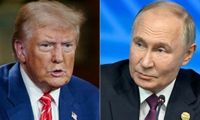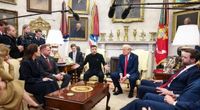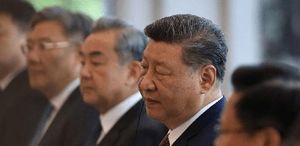US President Donald Trump’s special envoy expressed optimism about upcoming Ukraine-Russia talks, projecting that significant progress could be made over the next two days in Saudi Arabia. Meetings will feature delegations from both Russia and Ukraine engaging separately with US officials. The discussions, set for March 24, 2025, mark a purposeful shift in the US approach to the ongoing conflict between the two nations, which has persisted since early 2022.
On Sunday, March 23, 2025, Steve Witkoff, the envoy, stated during an interview with Fox News, “I think you’re going to see in Saudi Arabia on Monday some real progress, particularly as it affects a Black Sea ceasefire on ships between both countries.” He noted that previous negotiations had resulted in “lots of progress” and expressed faith in Russian President Vladimir Putin’s willingness to find a peaceful resolution. Witkoff remarked, “I feel he wants peace.”
This diplomatic outreach follows what many perceive as a dramatic turnaround in US policy towards Russia since Trump assumed office. Previously, under President Biden’s administration, the US adopted a much more aggressive stance, working closely with NATO allies to exert pressure on Moscow. Witkoff emphasized that the current US role is to mediate and understand perspectives from both sides: “I’ve never ever seen a situation where there isn’t two sides to a story.”
Despite this optimism, Kremlin spokesman Dmitry Peskov cautioned that discussions remain at a nascent stage, hinting at challenging negotiations ahead. In an interview, he pointed to the ongoing complexities of reaching a ceasefire, stating, “We are only at the beginning of this path,” and underlining that “difficult negotiations” lie ahead for both parties.
Additionally, President Putin has dismissed a joint request from Ukraine and the US for an immediate 30-day ceasefire, suggesting that Russia could instead contemplate halting attacks solely on energy facilities.
The negotiations, which had initially been planned to occur simultaneously, may now feature separate talks regarding a possible humanitarian truce. Witkoff indicated that the primary focus of these meetings would likely revolve around reviving a 2022 Black Sea grain deal that was critical for ensuring safe navigation for agricultural exports.
President Volodymyr Zelensky of Ukraine shared that Ukrainian and US delegations would convene on March 23, 2025, though he did not provide much detail about this aspect of the discussions. As tension fuels the environment, recent reports indicate that a fresh wave of drone attacks have occurred—Ukraine officials reported that a recent Russian drone strike resulted in the deaths of three people in Kyiv.
The situation escalated further when Zelensky urged Ukraine’s allies to intensify their efforts in putting pressure on Russia, emphasizing the need for new strategies to bring an end to ongoing hostilities. He used social media as a platform to voice, “New decisions and new pressure on Moscow are needed to bring an end to these strikes and this war.”
The backdrop of these talks is a complex narrative, where Russian claims of territorial legitimacy based on referendums in annexed regions clash with Ukraine's position that these votes lack legitimacy. Witkoff characterized Russia’s perspective on these territories, saying, “there’s a view within the country of Russia that these are Russian territories.” He highlighted these issues not as taking sides but as acknowledging the battlefield complexities, which complicate potential negotiations.
Amidst escalating violence, Russia reported that it repelled numerous Ukrainian drones over the weekend, with only isolated casualties reported on either side. However, there remains a palpable and urgent need for both sides to consider negotiations that can lead to a substantial cessation of hostilities in the wake of nearly three years of conflict.
In Washington, officials are grappling with the possibility that achieving a lasting agreement might exceed the original timeline, particularly due to prevalent gaps in negotiating stances between Moscow and Kyiv. A senior administration official noted that the upcoming meetings have the potential to either exacerbate or bridge these divides.
Set against all this ongoing dialogue, April 20 looms as a significant date not just for Easter celebrations among Eastern and Western Christian communities, but also as a hypothetical moment for a possible meeting between Presidents Trump and Putin, as hinted by various Russian media sources.
As the world watches, the coming days may indeed be pivotal for both leaders in their pursuit of a palpable and definitive peace agreement capable of concluding the long-standing frictions. Will these intentions translate into meaningful outcomes, or will the talks reflect the existing divide? Only time will tell.





